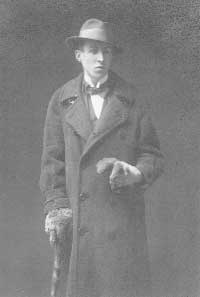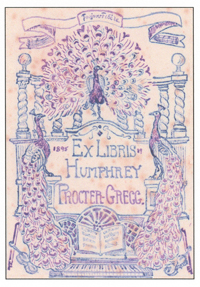
- 7 clarence grove
- horsforth
- leeds, LS18 4LA
- UK
- tel: 0113 258 1300
- order online
- www.editiondb.com
- info@editiondb.com
- Back to catalogue
- Back to biography
- List of works
- Recordings
- Obituary
- P-G's school days
- Performances
- Memoirs
- Reviews
Auto-biographical note by Humphrey-Procter Gregg 1895-1980 - C.B.E.
Introduction by Michael Almond
In the late 70's I tried to encorage P-G to pen some autobiographical reminiscences; but shunning all forms of self-promotion, as he habitually did, despite major achievements in his life, in academia, in the field of operatic production and translation, and a large output of instrumental and vocal compositions, mainly aimed at colleagues and friends, P-G resisted. Nor would he dictate to a cassette recorder, so acutely did he feel his speech defect and irregular breath control, occasioned by serious illnesses and primitive 'cures' when a young child - "this became the bane of my life" as he said. Eventuall he did yield, but sadly only with the two pages which are reproduced here. His command of the written word (in English, French and German), allied to memories of Schoenberg, Rachmaninov, Delius, Elgar and Beecham during a golden age of music in England between the Wars would have been absorbing indeed.
__________________________________________________________________________________________
Whatever interest my personal life may have for present and future readers must depend on my being one of the comparatively few and fast-diminishing of English-men who can recall English life in a small class of the population (now almost extinct) in the three separate epochs of the present [20th] century. The two World Wars of course changed the character and balance of society to a degree unrealisable by all those born later than, say, 1910 and remembering two of these epochs, and those born, say, later than 1915 only remembering one of them. I was born on July 31st 1895 and we remember my father making the contingent family drink to the new century; remembering the death of Queen Victoria better still: better still the first motor car and gramophone to appear in my native Westmorland, and there, in Kirkby Lonsdale, the arrival of electric light and the telephone. We could always in thise day send 240 letters and 480 postcards for £1 and postal service was splendid. Now……
Kirkby Lonsdale, still preserving a fair amount of its beauty and a small amount of its character, was certainly a profound influence on my own character and personality, though none whatever on my musical or operatic development: the beautiful Lune Valley gave a sort of insularity to South Westmoreland (spelt both ways): the delightful country houses and (mostly sporting) estates on both sides of the river, the graceful fells rising in height and austerity as one neared its source, but mostly well-wooded as one followed the flattening country southward to Lancaster near the river’s mouth. Incidentally, Macaulay’s ‘Armada’ and its sonorous conclusion, was one of my earliest thrills from the realm of Poetry – it still works an occasional emotional response beyond all reason! But my roots were deep in the Lune Valley where little of my life has been spent (none of my working or adolescent life). The family home and estate, small by a number of its neighbours, centred on Cressbrook, a large charming house, garden and view – the farms and little ‘shoot’ were in Hutton Roof: my father had a life interest and it was entailed on to myself. When I came of age we had to bar the entail partly on account of Death Duties, the achievement of Lloyd George, partly in consideration of the rest of the family, my brother and three subsequent sisters. All that is another story but it was a grief unforgotten: though without its loss, my musical life would have been impossible and inflation would, in any case, have killed it. As it was, it had to be let as a Preparatory School while I was still at school in the Isle of Man: it did very well till recently: inflation killed that too. There my beloved Lune Valley goes out of my story.
The stronger and more powerful influences thrust all these into the background to make only few and brief reappearances for the rest of my life. But having been born into the class of the lesser landed gentry, my natural affinities are with and my natural reactions are theirs. This has been a great help in countering the drawbacks of ‘artistic’ temperaments and in all manner of social encounters: my parents, thank heaven, gave me and saw that I adopted, certain values and restraints, whence come one’s better judgements and sense of style, not, I think, quite those of the second, still less of the third of the century’s epochs.
Of the two major influences, poor health, stemming originally, I think, from poor circulation – at any rate I had what they called ‘gastric fever’ at around the age of 4 – 5 years – ulcers, I am now told, the result of an original chill. The treatment then called for was two years in a flat wheel-chair and miserable diet but above all huge mustard poultices in the early stages which daily reduced me to gasping and irrepressible tears. This appears to have produced irregular breathing and a speech defect appeared which became the bane of my life and which only began to leave me in recent years – the microphone still shows the basic flutter of the diaphragm and unsteadiness of every breath and tune: I hate to write about it but it has been a raveling thread of my daily contact over so many years. I could write a longer account of it, the efforts by the justly famous Clive Fogarty and the frustration and fear it engendered: that again is another story. But bad health did not end there – rheumatic fever, valvular disease of the heart, pneumonia and various minor ills all contributed to the story in double guise and keeping me both under the weather and out of the Forces: even ambulance in the first war had to be abandoned – a blessing in disguise, I suppose. At any rate it turned my life from an actor to a spectator-role, and largely owing to this will be due any interest any memoirs of my own or by anyone else, may have for readers.
The second major influence, or rather driving force has been an intense passion for anything which seemed to me of surpassing beauty: this has been somewhat akin to worship, partly by the nature of the emotion itself, partly by reason of poverty: the worship kept me humble (more or less!) and critical, whereas riches would have made me a collector! Quite a few people know what they like but not all such know why they like what they do: I think my passion for beauty (it is the second Deity in my Pantheon) does make me analyse an adored object and apply certain rather acid tests. Rather to my surprise, the tests are usually passed – one of them is to ask whether a note (in music), a drawing, a word, a colour or texture or sense of balance or duration could be bettered, or whether some factor would be better dispensed with. Certain flowers, birds, animals, pieces of music, pictures, poems, sculptures, buildings, even pieces of furniture, have always been able to excite a passionate admiration and desire for appraisal: hence one’s efforts, amateurly or in serious study, at imitation or creation – alas too many Deities and too little time for any great success or mastery! All I dare lay claim to is an occasional job decently done, e.g. the Beecham book and sculpture affairs, some pieces of music, or the fostering of live talent in most of my pupils including the string quartet activities which individually and collectively had some long term results – I ought to include the formation and tradition of a University Music Department. Some twenty-two operas and many song translations and versions which I dare to believe the best extant, have had little success and the several small concert halls and theatres I designed or helped to design all proved effective but were or are due to be pulled down for expansion in other directions. The several delightful homes I acquired and happy gardens I developed all served their time but all had to be sold.
More than all these things, I have loved a long and splendid list of friends: these “Time taketh all away”.
__________________________________________________________________________________________
Several of Humphrey Procter-Gregg's compositions have recently been recorded on the Dutton Epoch label.
Clarinet Concerto on Dutton CDLX 7153 - Ian Scott (clarinet) and the Royal Ballet Sinfonia conducted by Barry Wordsworth. CD Review
Sonata No.3 for violin and piano on Dutton CDLX 7165 - Richard Howarth (violin) and Ian Buckle (piano)
Sonata for clarinet and piano on Dutton CDLX 7165 - Nicholas Cox (clarinet) and Ian Buckle (piano)
Sonata for horn and piano on Dutton CDLX 7165 - Bob Ashworth (horn) and Ian Buckle (piano)
Westmoreland Sketches (Nos.23-26) on Dutton CDLX 7165 - Ian Buckle (piano)
- Back to catalogue
- Back to biography
- List of works
- Recordings
- Obituary
- P-G's school days
- Performances
- Memoirs

Procter-Gregg in 1918

P-G's bookplate